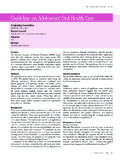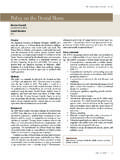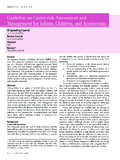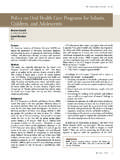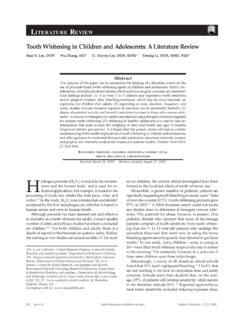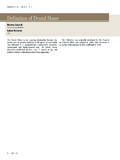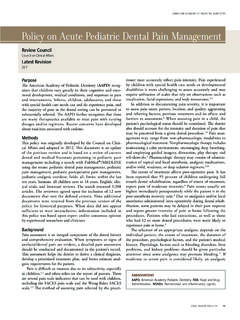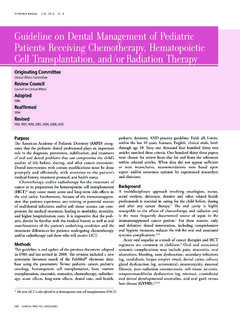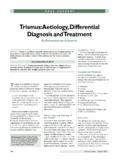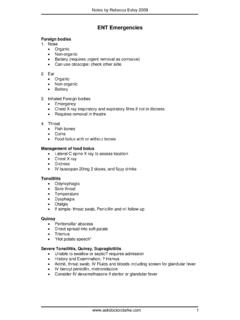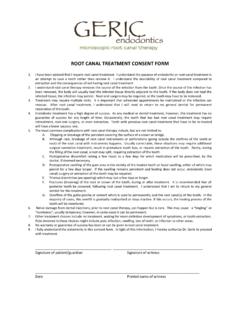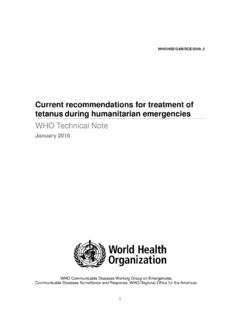Transcription of Review Council Latest Revision - Pediatric Dentistry
1 OFFICIAL BUT UNFORMATTED. Best Practices on Dental Management of Pediatric Patients Receiving Immunosuppressive Therapy and/or Radiation Therapy Review Council Council on Clinical Affairs Latest Revision 2018. Keywords: Hematopoietic Stem Cell transplantation (HCT), Low-level laser therapy (LLLT), Oral mucositis (OM), radiation therapy, chemotherapy, Pediatric patient, immunosuppressed patient hematologic considerations. Purpose The American Academy of Pediatric Dentistry (AAPD) recognizes that the Pediatric dental professional plays an important role in the diagnosis, prevention, stabilization, and treatment of oral and dental problems that can compromise the child's quality of life before, during, and after immunosuppressive therapy which lowers the body's normal immune response. This can be deliberate as in lowering the immune response to prevent the rejection of an organ or hematopoietic cell transplant *.
2 (HCT), or it can be incidental as in a side effect of chemotherapy, radiation therapy, or HCT conditioning. Dental intervention with certain modifications must be done promptly and efficiently, with attention to the patient's medical history, treatment protocol, and health status. Immunosuppressive therapy may cause many acute and long-term side effects in the oral cavity. Furthermore, any existing or potential sources of oral/dental infections and/or soft tissue trauma can compromise the medical treatment, leading to morbidity, mortality, and higher hospitalization costs. It is imperative that the Pediatric dentist be familiar with the patient's medical history as well as oral manifestations of the underlying condition. * The term HCT is also referred to as hematopoietic stem cell transplantation (HSCT).
3 Methods Originally developed by the Clinical Affairs Committee as Management of Pediatric Dental Patients Receiving Chemotherapy and/or Radiation and adopted in 1986, this document was last revised in 2013. The Revision included a new literature search of the PubMed /MEDLINE database using the terms: Pediatric cancer, Pediatric oncology, hematopoietic cell transplantation, bone marrow transplantation, immunosuppressive therapy, mucositis, stomatitis, chemotherapy, radiotherapy, acute effects, long-term effects, dental care, oral health, Pediatric Dentistry , practice guideline; field: all; limits: within the last 10 years, humans, English, birth through age 18. Two thousand sixty-five articles matched these criteria. Ninety-five papers were chosen for Review from this list and from the references within selected articles.
4 When data did not appear sufficient or were inconclusive, recommendations were based upon expert and/or consensus opinion by experienced researchers and clinicians. Background A multidisciplinary approach involving physicians, nurses, social workers, dieticians, dentists and other related health professionals is essential in caring for the child before, during and after any immunosuppressive ,2 Oral and associated systemic complications that may occur as a sequelae of immunosuppressive therapy include pain, mucositis, oral ulcerations, bleeding, taste dysfunction, secondary infections ( , candidiasis, herpes simplex virus), dental caries, salivary gland dysfunction ( , xerostomia), neurotoxicity, mucosal fibrosis, gingival hypertrophy, post-radiation osteonecrosis, bisphosphonate-related osteonecrosis, soft tissue necrosis, temporomandibular dysfunction ( , trismus), craniofacial and dental developmental anomalies, and oral graft versus host disease (GVHD)
5 1,3,4. All patients undergoing immunosuppressive therapy should have an oral examination prior to initiation of ,2. Prevention and treatment of pre-existing or concomitant oral disease is essential to minimize complications in this The key to success in maintaining a healthy oral cavity during therapy is patient compliance. The child and the parents should be educated regarding the possible acute side effects and the long-term sequelae of immunosuppressive therapies in the oral ,5-9 Every patient should be managed on an individual basis; consultations with the patient's physicians and, when appropriate, other dental specialists should be sought before dental care is Recommendations Dental and oral care before the initiation of immunosuppressive therapy Objectives The objectives of a dental/oral examination before therapy starts are three-fold:9.
6 To identify and stabilize or eliminate existing and potential sources of infection and local irritants in the oral cavity . without needlessly delaying the treatment or inducing complications. To communicate with the medical team regarding the patient's oral health status, plan, and timing of treatment. To educate the patient and parents about the importance of optimal oral care in order to minimize oral problems/ discomfort before, during, and after treatment and about the possible acute and long-term effects of the therapy in the oral cavity and the craniofacial complex. Initial evaluation Medical history Review : should include, but not be limited to, disease/condition (type, stage, prognosis), treatment protocol (conditioning regimen, surgery, chemotherapy, radiation, transplant), medications (including bisphosphonates), allergies, surgeries, secondary medical diagnoses, hematological status [complete blood count (CBC)], coagulation status, immuno- suppression status, presence of an indwelling venous access line, and contact of medical team/primary care physician(s).
7 1 For HCT patients, include type of transplant, HCT source ( , bone marrow, peripheral stem cells, cord blood stem cells), matching status, donor, conditioning protocol, expected date of transplant, and GVHD prophylaxis. Patients with a compromised immune system may not be able to tolerate a transient bacteremia following invasive dental procedures. The decision regarding the need for antibiotic prophylaxis for dental procedures should be made in consultation with the child's physician. Unless advised otherwise by the physician, the American Heart Association's standard regimen to prevent endocarditis is an accepted ,10 Dental history Review : includes information such as fluoride exposure, habits, trauma, symptomatic teeth, previous care, preventive practices, oral hygiene, and diet assessment. Oral/dental assessment: should include thorough head, neck, and intraoral examinations, oral hygiene assessment and training, and radiographic evaluation based on history and clinical findings.
8 Preventive strategies Oral hygiene: Oral hygiene includes brushing of the teeth and tongue two to three times daily with regular soft nylon brush or electric toothbrush, regardless of the hematological status. 7,8,11,12 Ultrasonic brushes and dental floss should be allowed only if the patient is properly If capable, the patient's teeth should be gently flossed daily. If pain or excessive bleeding occurs, the patient should avoid the affected area, but floss the other Patients with poor oral hygiene and/or periodontal disease may use chlorhexidine rinses daily until the tissue health improves or mucositis The high alcohol content of commercially-available chlorhexidine mouthwash may cause discomfort and dehydrate the tissues in patients with mucositis; thus, an alcohol-free chlorhexidine solution is indicated in this situation.
9 Diet: Dental practitioners should discuss the importance of a healthy diet to maintain nutritional status with an emphasis on foods that do not promote caries. Patients and parents should be advised about the high cariogenic potential of dietary supplements rich in carbohydrates and oral Pediatric medications rich in sucrose. 6 They should also be instructed that sharp, crunchy, spicy, highly acidic foods and alcohol should be avoided during chemotherapy, radiation and Fluoride: Preventive measures include the use of fluoridated toothpaste, fluoride supplements if indicated, neutral fluoride gels/rinses, or applications of fluoride varnish for patients at risk for caries and/or ,8 A brush-on technique is convenient and may increase the likelihood of patient compliance with topical fluoride therapy.
10 8. Lip care: Lanolin-based creams and ointments are more effective in moisturizing and protecting against damage than petrolatum-based Trismus prevention/treatment: Patients who receive radiation therapy to the masticatory muscles may develop trismus. Thus, daily oral stretching exercises/physical therapy should start before radiation is initiated and continue throughout ,14. Reduction of radiation to healthy oral tissues: In cases of radiation to the head and neck, the use of lead-lined stents, prostheses, and shields, as well as salivary gland sparing techniques ( , three-dimensional conformal or intensity modulated radiotherapy, concomitant cytoprotectants, surgical transfer of salivary glands), should be discussed with the radiation oncologist. Education: Patient and parent education includes the importance of optimal oral care in order to minimize oral problems and discomfort before, during, and after treatment and the possible acute and long-term effects of the therapy in the craniofacial Dental care Hematological considerations: Absolute neutrophil count (ANC): >2,000/mm3: no need for antibiotic prophylaxis1,14.
